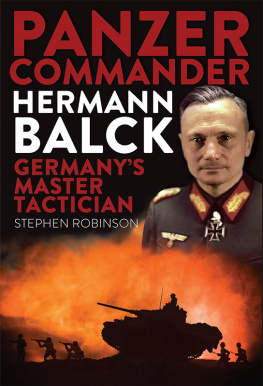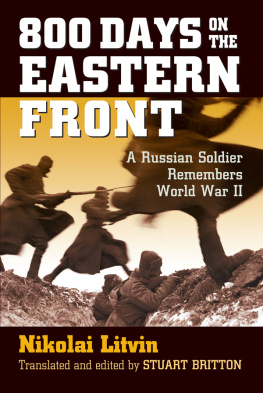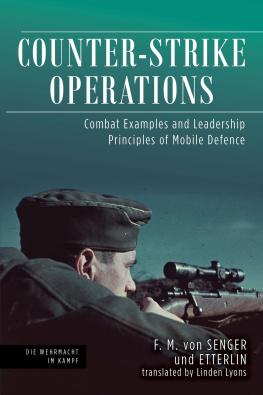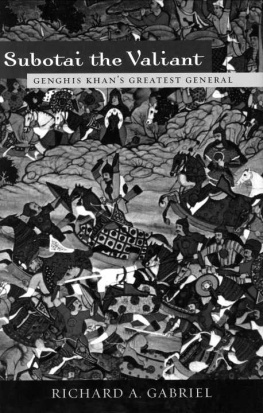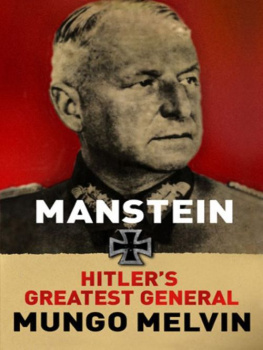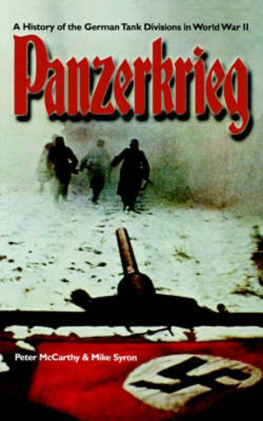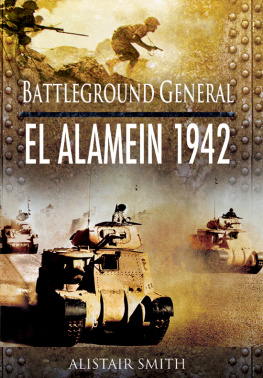Order in Chaos
FOREIGN MILITARY STUDIES
History is replete with examples of notable military campaigns and exceptional military leaders and theorists. Military professionals and students of the art and science of war cannot afford to ignore these sources of knowledge or limit their studies to the history of the U.S. armed forces. This series features original works, translations, and reprints of classics outside the American canon that promote a deeper understanding of international military theory and practice.
SERIES EDITOR: Roger Cirillo

An AUSA Book
ORDER
IN
CHAOS
The Memoirs of
General of Panzer Troops
Hermann Balck
HERMANN BALCK
Edited and Translated by Major General David T. Zabecki, USA (Ret.), and Lieutenant Colonel Dieter J. Biedekarken, USA (Ret.)
Foreword by Carlo DEste

Due to variations in the technical specifications of different electronic reading devices, some elements of this ebook may not appear as they do in the print edition. Readers are encouraged to experiment with user settings for optimum results.
Copyright 2015 by The University Press of Kentucky
Scholarly publisher for the Commonwealth,
serving Bellarmine University, Berea College, Centre College of Kentucky, Eastern Kentucky University, The Filson Historical Society, Georgetown College, Kentucky Historical Society, Kentucky State University, Morehead State University, Murray State University, Northern Kentucky University, Transylvania University, University of Kentucky, University of Louisville, and Western Kentucky University.
All rights reserved.
Editorial and Sales Offices: The University Press of Kentucky
663 South Limestone Street, Lexington, Kentucky 405084008
www.kentuckypress.com
The German edition of this book was published as General der Panzertruppe a.D. Hermann Balck, Ordnung im Chaos: Erinnerungen 18931948, 2nd ed. (Osnabrck: Biblio Verlag, 1981).
Library of Congress Cataloging-in-Publication Data
Balck, Hermann, 1893-1982.
[Ordnung im Chaos. English]
The memoirs of General of Panzer Troops Hermann Balck / Hermann Balck ; edited by Major General David T. Zabecki, USA (Ret.), and Lieutenant Colonel Dieter J. Biederkarken, USA (Ret.) ; foreword by Carlo DEste.
pages cm. (Foreign military studies)
An AUSA Book.
Includes bibliographical references and index.
ISBN 978-0-8131-6126-6 (hardcover : alk. paper) ISBN 978-0-8131-6127-3 (pdf) ISBN 978-0-8131-6128-0 (epub)
1. Balck, Hermann, 1893-1982. 2. GeneralsGermanyBiography. 3. Germany. HeerBiography. 4. World War, 1914-1918Personal narratives, German. 5. World War, 1939-1945Tank warfare. 6. World War, 1939-1945Personal narratives, German. I. Zabecki, David T. II. Biederkarken, Dieter J. III. Title.
U55.B228A3613 2015
355.009dc23
[B]
2015011481
This book is printed on acid-free paper meeting the requirements of the American National Standard for Permanence in Paper for Printed Library Materials.

Manufactured in the United States of America.

| Member of the Association of
American University Presses |
Contents
Maps
Foreword
Many of the German generals of World War II were superb battlefield commanders who not only understood mobile warfare, but also were masterful strategists and tacticians. Erwin Rommel, Erich von Manstein, Albert Kesselring, Hans Guderian, and Hasso von Manteuffel are among the well-known successful German generals that have garnered considerable attention for their exploits. Yet, one name is conspicuously missing from the list of successful generals: General of Panzer Troops Hermann Balck.
One of the means by which we learn is through a study of history and the lessons it teaches us. There have been few better ways to learn about World War II than to scrutinize the German generals who commanded the armies, corps, and other military units that fought so well against the Allies during the most deadly war in the history of mankind.
Shortly after the end of the war, the U.S. Army European Command Historical Division conducted a series of interviews and interrogations of those German generals who had been captured. The objective was to acquire a detailed knowledge of German military operations for the U.S. Army official history. It was also to gain a better understanding not only of an enemy that had fought tenaciously and well during the campaigns in the Mediterranean, the eastern front, and Northwest Europe, but of war. The transcripts of those interviews that number in the hundreds have been preserved and have proven invaluable to historians like myself who have studied and written about World War II.
There is much to learn from reading Balcks memoir. He was, as one of his translators, David Zabecki, once noted, The Greatest German General No One Ever Heard Of. Although Germany produced a number of truly outstanding Panzer commanders during World War II, few were more successful or more accomplished than Hermann Balck.
Major General F. W. von Mellenthin, the well-known postwar author of Panzer Battles, served with and knew Balck well, and has said of him, If Manstein was Germanys greatest strategist during World War II, I think Balck has strong claims to be regarded as our finest field commander.
Freeman Dyson, the famed physicist and mathematician, has written a book called Weapons and Hope that contains an in-depth assessment of Balck that goes even further. Dyson calls him, Perhaps the most brilliant field commander on either side in World War II.
A classic example of Balcks skill as a troop leader and tactician occurred during one tank battle in Russia in 1942 while in command of the 11th Panzer Division. With no prior notice, Balck broke off an attack, moved his division twenty kilometers in a matter of hours in the dead of night, and counterattacked a Soviet breakthrough with such surprise that it not only foiled the attack but also destroyed seventy-five Russian tanks without the loss of a single Panzer.
Balck and General George S. Patton had much in common. Both were dynamic commanders who believed that offensive action was always preferable to defense. It is quite remarkable, Balck once noted, that most people believe that attack costs more casualties. Do not even think about it; attack is the less costly operation.... Nothing incurs higher casualties than an unsuccessful defense. Therefore, attack wherever it is possible.
The two leaders also believed strongly in the power and influence of personal leadership. Like Patton, Balck was a very hands-on commander who believed in being up front with his troops, both to control the battle and to uplift their morale.
Balck is rarely mentioned in the U.S. Army official histories and has been mischaracterized in the volume on the Lorraine campaign, while briefly in command of Army Group G, as a strutting martinet. However, Freeman Dyson has a vastly different view of Balck and characterizes him as a soldier who never took himself particularly seriously. He went on winning battles, just as Picasso went on painting pictures, without pretensions or pious talk. He won battles because his skill came to him naturally. He never said that battle-winning was a particularly noble or virtuous activity; it was simply his trade.
Next page


